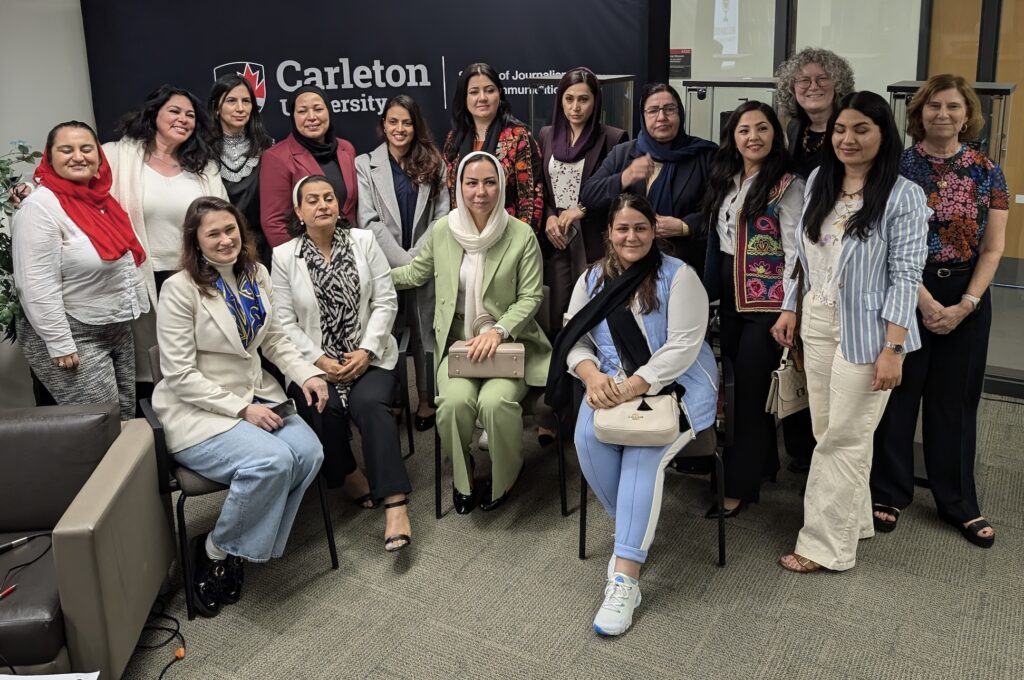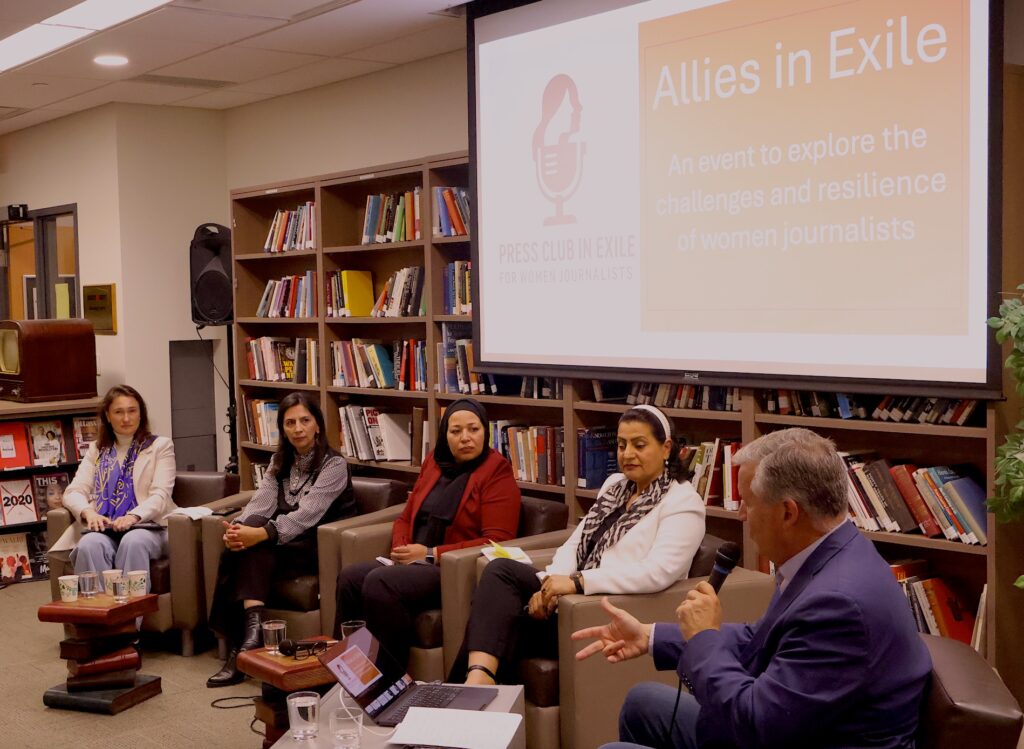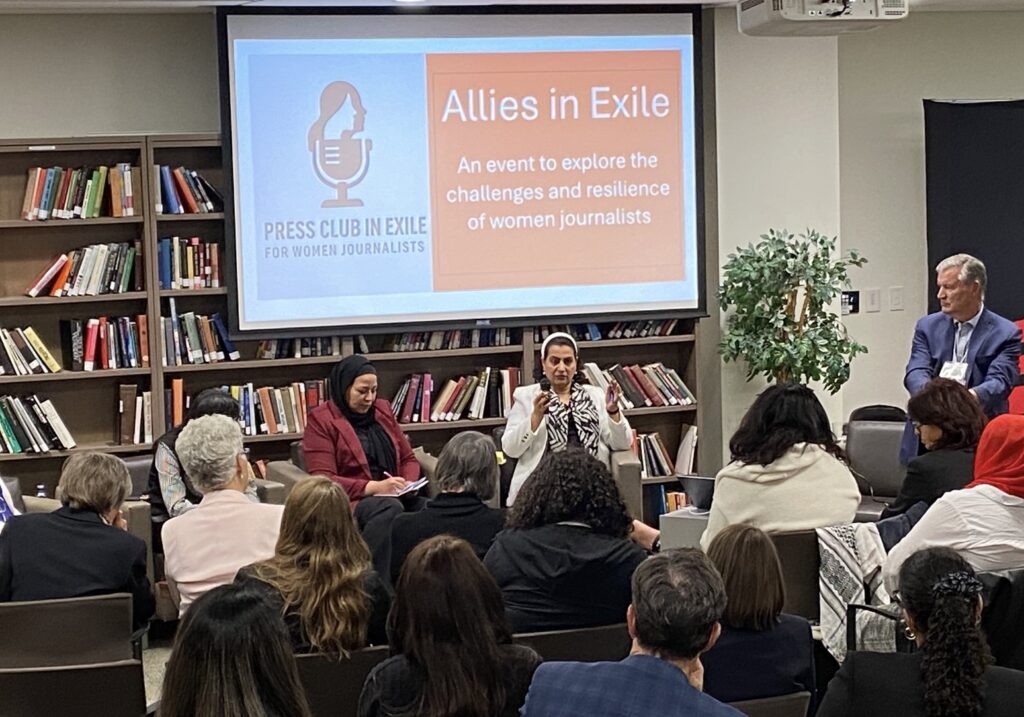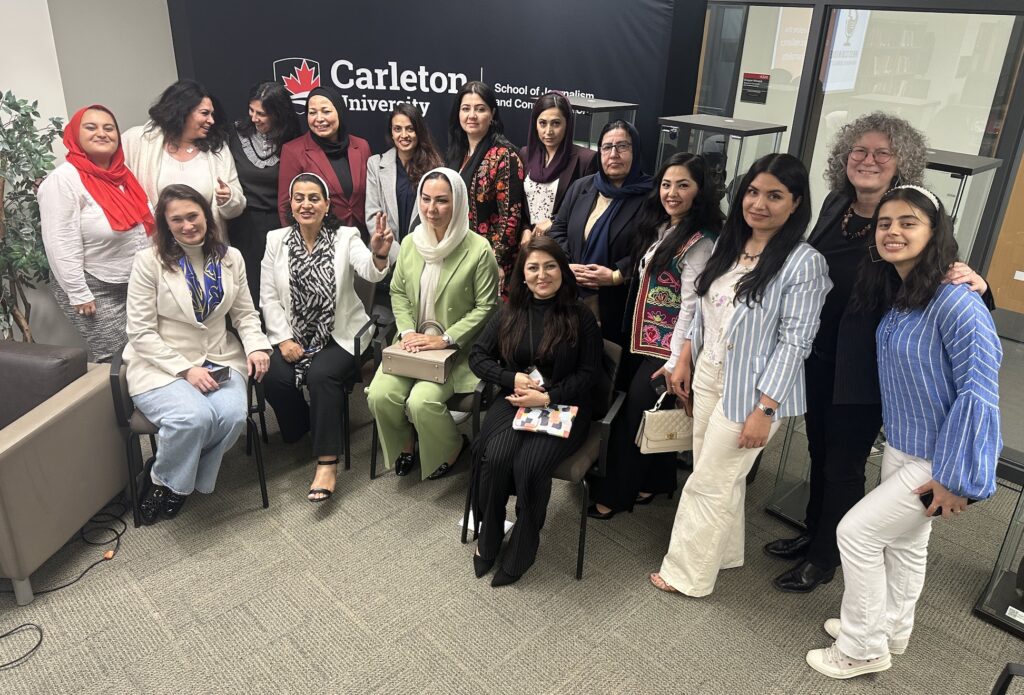
Prominent journalists from Afghanistan, Turkey, Ukraine, Egypt and elsewhere came together at Carleton University on May 22 to establish a network of support for female reporters in exile around the world — and they’re encouraging others to join the movement.
The “Allies in Exile” panel discussion and organizational liftoff was held at the Richcraft Hall home of Carleton’s School of Journalism and Communication. The event coincided with the Scholars at Risk conference being held the same day at Richcraft Hall, and where many of the same themes — oppressive governments, the displacement of dissenting voices, the struggle to maintain careers in exile — were being examined by delegates.
The Allies in Exile gathering focused on the challenges facing female journalists forced out of their home countries while sharing information about the newly formed Press Club in Exile for Women Journalists.
‘This initiative is deeply personal. As an exiled journalist myself, I have experienced isolation, uncertainty and a deep need to stay connected with my network and my community.”
— Exiled Afghan journalist Farida Nekzad, Journalist-in-Residence at Carleton University
Key speakers for the evening included Afghan journalist and press freedom advocate Farida Nekzad, Egyptian journalist and social justice activist Kawther Ramadan, Ukrainian broadcaster and political analyst Anastasiya Ringis, and Turkish-born investigative journalist and author Arzu Yildiz.
Nekzad, the leading figure behind the Press Club in Exile for Women Journalists, also established the Center for the Protection of Afghan Women Journalists in 2017. Nekzad fled Afghanistan in 2021 following the Taliban’s return to power and is a Journalist-in-Residence at Carleton University.

She opened the panel with a brief description of what the Press Club would entail, discussing how it will provide a virtual network as well as a physical space to bring female journalists together and “hope for a better future.”
“This initiative is deeply personal,” Nekzad told the gathering of about 50 people, many of whom were also attendees of the Safe Havens and Knowledge Networks in Canada conference. “As an exiled journalist myself, I have experienced isolation, uncertainty and a deep need to stay connected with my network and my community.”
Nekzad noted that around the world today, more female journalists are being displaced than ever before. She said now is the time to connect women across borders. The Press Club, she added, will also host workshops, training, events and services that respond directly to the needs of its members.
Following Nekzad’s opening address, the panelists each detailed their own reporting careers, and how their experiences in their home countries shaped who they are as journalists today.
Ramadan detailed how her reporting in Egypt helped build bridges between the Global North and Global South and challenged dominant narratives. She also described how the Arab Spring uprisings of 2011 — which ended former Egyptian president Hosni Mubarak’s almost 30-year rule— influenced her understanding of the power and risks of telling the truth.

“When I came to Canada, I brought with me more than the hope,” Ramadan reflected. “I carried a commitment to continue the work that I started in Egypt, to keep asking hard questions to hold the space for silent voices.”
After graduating from Sheridan College’s journalism program, Ramadan faced intersectional barriers when finding work as an immigrant woman of colour, creating challenges for her to continue pursuing journalism in Canada. However, she decided to use her skills for roles in advocacy and academia. She then founded the Women for Justice Foundation and is involved with the University of Ottawa’s Voices in Exile project.
She views the nascent Press Club as not just a network, but also as a lifeline and source of healing.
“When I came to Canada, I brought with me more than the hope. I carried a commitment to continue the work that I started in Egypt, to keep asking hard questions to hold the space for silent voices.”
— Kawther Ramadan, exiled Egyptian journalist and social justice activist
“Many of us never stopped reporting. We just had to reinvent how, where and with whom, often in isolation (and) often without protection,” Ramadan said. “To be a woman journalist in exile is to carry both memory and responsibility, and if we want to continue this work, not alone, but as a movement.”
Ringis shared her story of having to relocate to Canada after fleeing from the Ukraine during the full-scale Russian invasion that began in February 2022. Ringis had worked previously as a TV anchor for Suspilne TV, and was banned from Crimea by Russian authorities in 2016 because of her reporting and support of the Crimean Tatars following the Russian annexation of Crimea in 2014.
“I don’t want you to perceive Ukrainians, especially Ukrainian journalists, as a victim,” she said. “We have always been a part of a civil society and driving force during all political turning points.”
She further discussed the challenges faced by Ukrainian journalists, including targeted attacks and media outlets ceasing operations. Since the Russian invasion began, more than 100 Ukrainian journalists have been killed, with 30 currently being held in captivity by Russia.
“I have a fear that when war finishes, I’m not sure that I will have my people with whom I work side by side . . . It’s forbidden for them to show that they are press, because they will be killed immediately.”
Ringis emphasized the need for a Press Club to support Ukrainian journalists and help them rebuild their lives and careers.
“We still have this hope to re-establish.”
The final panelist to speak, the Turkish investigative reporter Yildiz, talked about her work on unresolved murder cases and illegal weapons supplies.
“When I went to court, I realized the true face of my country,” she said. “When you cover the news, you never know what really happened to you, right?”
Yildiz left her family to seek refuge away from police after she was accused of spreading terror propaganda due to her reporting. She eventually reunited with her children, but had to live in exile for their safety.
“I realized I stole somebody’s life. This is the cost I need to pay, not them,” she said.
After escaping Turkey, Yildiz decided to move to Canada. However, she has continued to face difficulties as a journalist in a foreign country.

“At the beginning I didn’t know language, anybody, anyone,” she said. “It’s not easy to build a new life here.”
Yildiz’s experience, many of which are shared by the other panelists and many journalists in attendance, served as a strong reminder of the importance of the Press Club initiative.
Nekzad encouraged other female journalists in exile to join the cause and expressed hope that the Press Club can offer support and unique solutions through collective action.
“This will be a safe home for everyone together,” she said. “Believe me, one day, you will be witnessed.”


